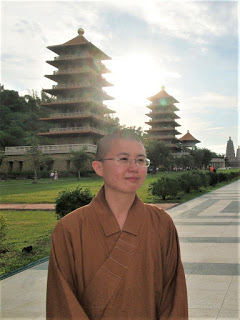
Speaker: Venerable You Lu
Fo Guang Shan Buddha Musuem
I. Introduction
Hi everyone, welcome back to The Story of Purna. Today is the third session of the story, and if you still remember, last week, I talked about the renunciation of Purna, which was followed by the Buddha’s discourse on the six senses, and Purna’s request to teach in Sronaparantaka.
II. Purna and the Hunter
Having obtained the Buddha’s permission to teach in Sronaparantaka, Purna arrived in the city and met a hunter looking for a deer. Wanting to stop the hunter from further killing, Purna lifted his upper garment and asked the hunter to strike him at the belly.
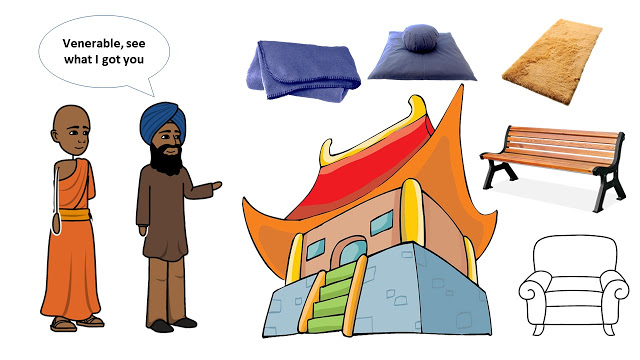
The hunter was impressed by Purna’s gentle forbearance and decided not to attack him. Then Purna taught him the Dharma and in return, the hunter constructed 500 viharas furnished with blankets, cushions, woolen rugs, benches and couches. After three months of diligent practice, Purna realized the three knowledges, which are:
- knowledge of one’s former lives and of the former and future lives of others
- knowledge of psychic powers
- knowledge of the termination of rebirth and defilements
and thus became an arhat.
III. Purna and the Brahmin
In the Chinese Sutra of the Wise and the Foolish, however, the first person Purna met was not a hunter. Instead he met a wealthy brahmin. He tried to beg alms from the brahmin but was chased away by him. Purna then approached others for food. On the next day, Purna tried to beg alms from the same brahmin, and when he saw Purna turning up at the door again, he was so mad that he beat him up until he was on all fours. However, despite being badly beaten, Purna did not show any sign of anger. When the Brahmin saw that, he felt deeply ashamed for what he had done to Purna and repented. Purna settled down in Sronaparantaka and with diligent practice, he attained arhatship, which is similar to what was recorded in the Purnavadana.
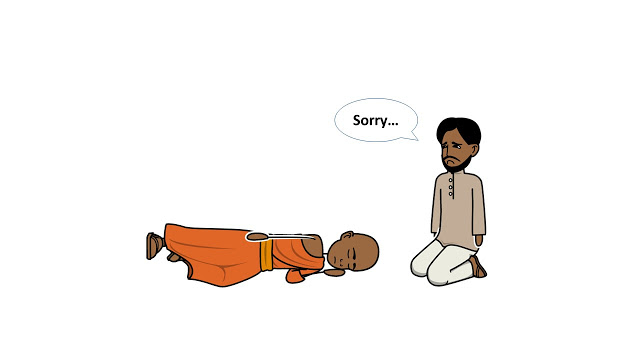
In both versions of the story, Purna displayed enormous patience even though he was met with adversity.
The Dharmasaṃgīti Sūtra speaks of six kinds of merit gained by a bodhisattva who learns to be patient under insult:
- If a bodhisattva can listen to insults as if he were merely listening to an echo in a mountain gorge, then he will have achieved “the wisdom of sound.”
- If a bodhisattva can endure being beaten as if he were merely watching forms move in a mirror, then he will have achieved “the wisdom of forms.”
- If a bodhisattva can endure suffering as if he were merely watching an illusion, then he will have achieved “the wisdom of illusion.”
- If a bodhisattva can endure anger, then he will have achieved “the wisdom of inner purity.”
- If a bodhisattva can endure the Eight Winds, then he will have achieved “the wisdom of phenomenal purity.”
- If a bodhisattva is not polluted by the troubles of life, then he will have achieved “the wisdom of manifest conditions.”
IV. Practice of Patience—Venerable Master Hsing Yun
Venerable Master Hsing Yun has shown a similar display of patience when he was ordained as a monk at a young age. He was only twelve years old when he arrived at Cloud Dwelling Mountain Temple, yet, he was required to endure three- to four-hour lectures while kneeling on gravel with joined palms. When finally allowed to stand, he often found small stones lodged in his knees, and the hours endured with his palms joined left his hands rigid and stiff. When Venerable Master received full ordination at the age of fifteen, he learned that sometimes you can’t win no matter how hard you try.
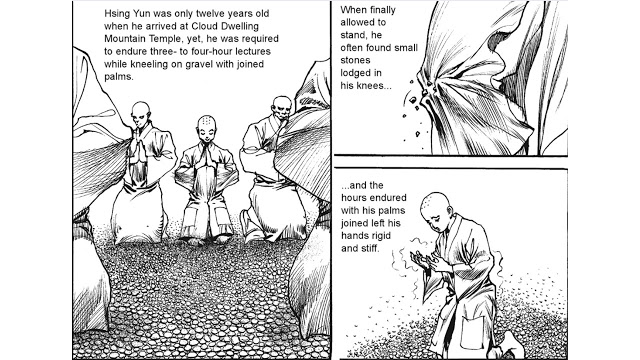
During the ordination, his preceptor asked him if he had ever killed any living beings. Venerable Master answered, “No!” and suddenly was struck with a willow branch.
“Not even a mosquito or an ant?” he was questioned.
He quickly changed my answer and admitted, “Yes!”
And Venerable Master was then struck again, because killing living beings is breaking one of the precepts.
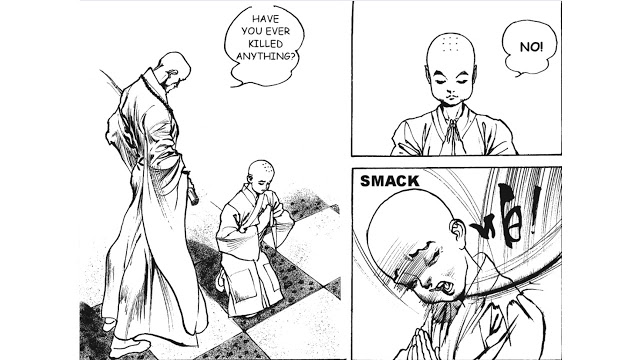
The preceptor then asked if his master had sent him to come to be ordained. Venerable Master answered, “No, I came by myself!” and he was then struck a third time.”So what if you hadn’t been sent? Would you still have come? So you just do things on your own? That deserves punishment!” He accepted the beating humbly and said, “Yes, it was my master who told me to come.”The preceptor then shouted, “So what if you hadn’t been sent? Would you still have come?” Venerable Master was then struck a fourth time.
Venerable Master was humbled by this incident and his character and commitment began to take shape. He learnt to be content in every situation, and to live in harmony and to stay carefree in circumstances, yet showing concern for others at the same time.
When Venerable Master Hsing Yun came to Taiwan, his first years were very difficult because Buddhism was not well accepted then. Being an outsider from China, committed to spreading Buddhist teachings, Venerable Master was attacked with criticism, purposefully undermined, and excluded from many favorable opportunities. Frequently, his lectures were disrupted. But instead of feeling discouraged by such misunderstandings and disturbances, he concentrated on what a monk should practice, and that is, proving himself through sincere deeds and responding to attacks with calmness. Venerable Master said that, “Endurance does not mean retreating, instead, endurance is the ability to face unfavorable circumstances with a calm mind”
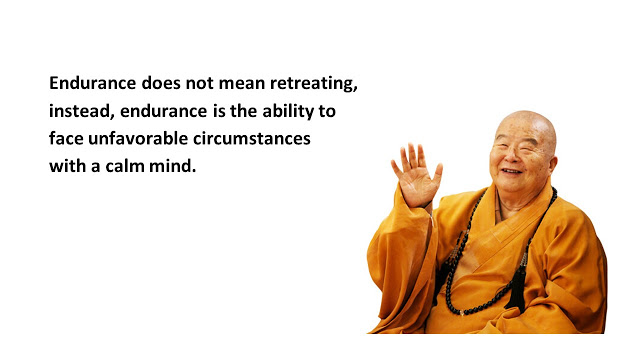
But endurance does not necessarily mean being passive or to be accepting of injustice. In the book The Philosophy of Being Second, Venerable Master says that, “Although I always praise endurance, there are circumstances I find hard to tolerate. I do not like having people stand in the back during my lectures when I see that there are empty seats in front. When the rights of people are violated, I am indignant at the injustice. When disciples are impolite to visitors, I scold them. When good causes are not supported, I feel uneasy. I do not recommend submitting to humiliation or indulging in wrongdoings. The purpose of tolerance is to shoulder these obligations for the sake of benefiting all beings.
“Throughout the years, I have come to understand three forms of endurance. To endure for sentient beings is to acquire the strength needed to survive; to endure for the sake of the Dharma is to use Buddhist teachings to alter one’s thoughts and attitudes; to endure for the ultimate Dharma is to see the truth of existence — a status of non-arising and non-ceasing. Those who can endure for sentient beings possess the courage to face the problems of everyday living. Those who can endure for the sake of the Dharma will free themselves from worldly defilement. Those who can endure for the ultimate Dharma will enjoy a pure land wherever they go.”
V. Purna and the Offering of Sandalwood
Back to the story, Purna had advised his brother, Bhavila, not to travel out to the ocean to obtain wealth. However, Bhavila was encouraged by other merchants to cross the ocean for more sandalwood, so despite Purna’s advice, he went out to the sea with the merchants. The sandalwood forest was governed by yaksas (while in the Chinese text, they were nagas), who were furious with them taking sandalwood so they made the waves so rough that the merchants were stuck in the ocean. In meditation, Purna percevied that his brother, Bhavila, and other merchants were in danger. Using his transcendental powers, he transformed himself into a gandharva to threaten the yaksas. Having done so, Bhavila and his merchants returned safely back to the kingdom with the sandalwood they had loaded.
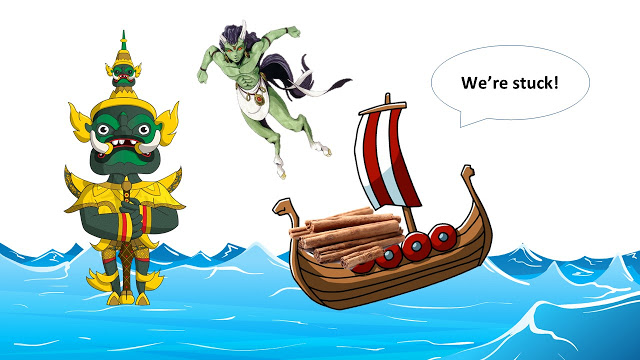
Back in the kingdom, Purna proposed to Bhavila that he should construct a pavilion made from the sandalwood he had gathered to worship the Buddha. Purna found craftsmen to build the pavilion and within a short time, the pavilion was constructed.
Purna got his brothers back together and led them in a ceremony, dedicating the pavilion to the Buddha. Then Purna led his brothers to climb onto the roof of the pavilion. Facing the Jetavana Grove, they knelt on the ground, strewed flowers, waved incense and Purna, with the help of an attendant, presented a golden vase. They proceeded in using their mental powers visualizing offerings of incense to the Buddha.
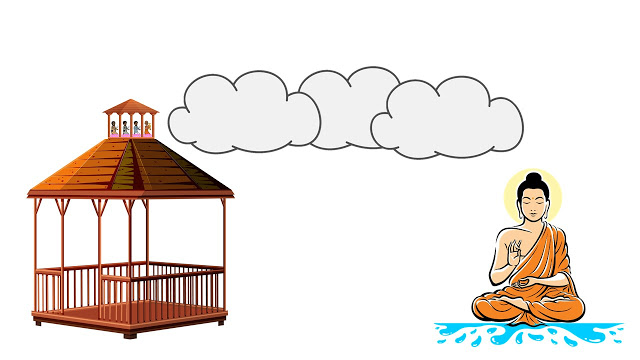
The incense materialized as a canopy of clouds that stretched from the pavilion to the crown of the Buddha and his assembly of disciples. Then they visualized washing the Buddha’s feet with water from the golden vase, and the water materialized around the Buddha’s feet.
It is based on this incident that the Chinese “Praise of Incense Offering” came about. The “Praise of Incense Offering” goes like this:
Incense burning in the censer,
All space permeated with fragrance.
Buddhas perceive it from every direction.
Auspicious clouds gather everywhere.
With our sincerity,
Buddhas manifest themselves in their entirety.
We take refuge in the bodhisattvas mahasattvas.
It was due to the sincerity of Purna and his brothers that the sandalwood incense manifested as an offering of auspicious clouds. Therefore, when we chant this Praise at the beginning of a prayer session, if we offer the fragrance of incense with sincerity, the Buddhas in all directions will be able to perceive it.
When Ananda saw the canopy of incense, he asked the Buddha where it came from. The Buddha replied,
“From the city of Surparaka, Ananda.”
“Venerable, how far away is the city of Surparaka?”
“More than a hundred yojanas, Ananda.”
A yojana is a Sanskrit term which is a standard measure of distance in ancient India, and often used in Buddhist texts; it is said to be the distance a team of oxen could travel in one day. Modern estimates of this distance vary widely, with the figure of eight miles often provided as an approximation, although estimates of four to ten miles (six to sixteen kilometers) are also found.
If we check that out on Google map, Surparaka, which is modern-day Nala Sopara, is over 1,500 km away from Sravasti and would take about 30 hours to travel by car.
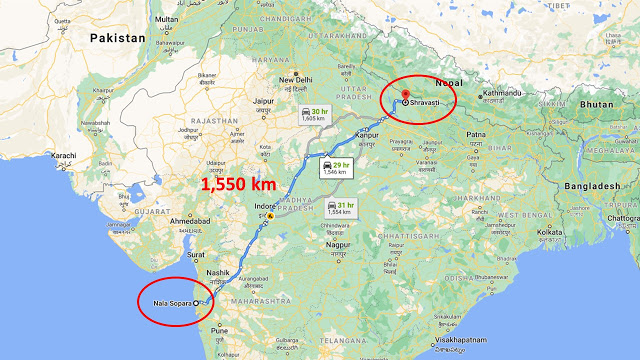
This is akin to traveling from Paris in France to Warsaw in Poland. It must have been amazing to see that stretch of incense cloud canopy across the sky, from the Pavilion at Surparaka, all the way to Sravasti, where the Buddha is.
Then Ananda asked the Buddha, “Are we going there?”
“Ananda, announce this to the bhiksus: ‘Whomever among you is able, shall be going to the city of Surparaka tomorrow. Come and take a food-ticket so that you’ll be able to eat.’”
“So be it, Venerable,” said Ananda in agreement.
He got the food-tickets and stood before the Buddha. The Buddha took a food-ticket as did all the other Elders and venerable bhiksus. Purna, who had been liberated through insight, was seated in that very assembly, and he attempted to take a food-ticket. But the Ananda addressed him saying that Surparaka-city was more than a hundred yojanas from there, and could only be reached by those with supernatural powers.
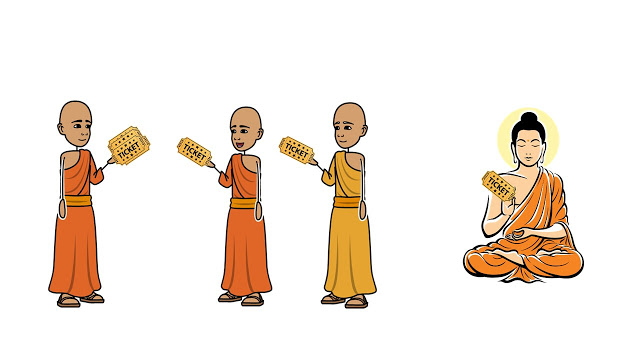
III. Purna’s Attainment of Supernatural Powers
Purna had been liberated through insight and had not developed psychic powers. He thought: Although I have attained liberation, I have not achieved the psychic powers.
Then, generating spiritual energy and producing psychic power, before the Ananda could give a food-ticket to the third Elder, Purna stretched out his arm as long as an elephant’s trunk and took the food-ticket.
The Lord then announced to the bhiksus: “O my bhiksus, this one is foremost among my bhiksus and close disciples in the matter of accepting invitations to meals. Among those who take food-tickets, Purna is foremost.”
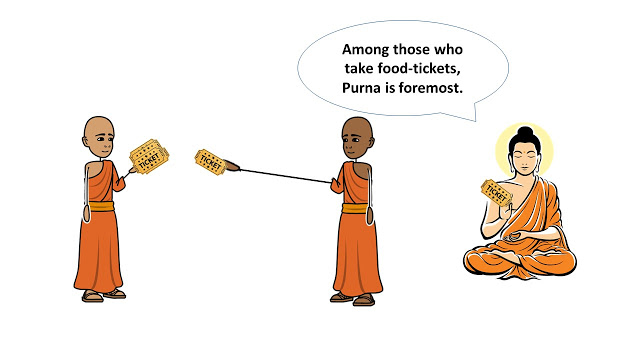
We normally think of Purna as being foremost in expounding the Dharma, but in this story, Purna is also being praised by the Buddha for being foremost in taking food-tickets. Here, it does not mean that Purna has obtained the most food-tickets, but that he is most worthy of receiving offerings.
Then the Lord summoned Ananda: “Go, Ananda, announce this to the bhiksus: whomever has acquired psychic powers is to go to Surparaka by means of those powers and accept the invitation for a meal.”
Following the Buddha’s instructions, Ananda, then announced to the bhiksus: “Venerable Sirs, the Lord has spoken thus: “Bhiksus, whomever has acquired psychic powers is to travel to Surparaka by means of those powers and accept the invitation for a meal’.”
Who would be traveling to Surparaka to accept the invitation for a meal? We will find out next week.
Thank you again for tuning in to English Dharma Services. If you haven’t subscribed to this channel, please subscribe and hit the bell button so you would be notified on the latest updates. Goodnight and see you next week!

